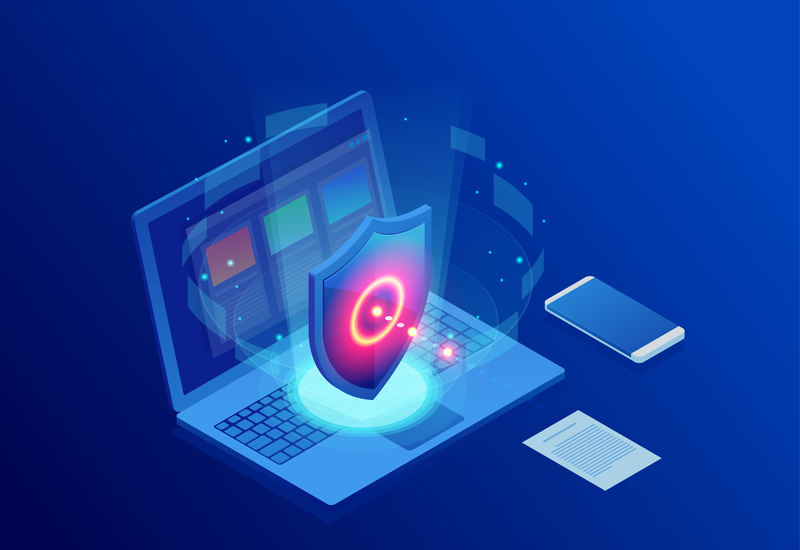Published on 29 September 2021
The online world can feel intimidating, with threats hiding behind seemingly innocent links and emails. One wrong click can compromise sensitive information, cost you valuable data, and even disrupt your entire operation. For businesses large and small, ensuring online safety is critical, not just for avoiding monetary losses but for protecting client trust and company reputation.
So, what can you do to secure your business online? Start with practical steps, like educating staff on cybersecurity, strengthening passwords, regularly updating software, using VPNs and secure networks, and installing firewalls and antivirus software. Additionally, investing in data backups and encryption, setting up phishing filters, and controlling physical access to devices all contribute to a robust defence against cyber threats.
Working with an IT security expert like Bluebell IT Solutions ensures you have reliable support and advanced cybersecurity solutions tailored to your needs. These key tips help you build a secure online environment, allowing you to focus on running your business with peace of mind.
Phishing emails are responsible for a staggering 94% of malware attacks, making them a prevalent and dangerous threat. These emails are designed to look legitimate, often mimicking trusted brands or organisations, which makes them especially deceptive. Training staff to recognise phishing attempts and suspicious links is one of the most effective ways to safeguard your business, as human error remains one of the biggest vulnerabilities.
The National Cyber Security Centre provides a free e-learning kit that covers phishing, data security, and other essential online safety measures. Taking it a step further, you could also consider Cyber Essentials certification, a government-backed scheme that helps protect organisations from common cyber threats. Bluebell IT Solutions, accredited under Cyber Essentials Plus, can help guide your business through this process and ensure your team is well-prepared.
Weak passwords are a common gateway for cybercriminals, so encourage employees to create strong, unique passwords for each login. Passwords should ideally be long phrases or a mix of letters, numbers, and symbols, making them difficult for attackers to guess. For example, a phrase like “MyC@tL1kesT0Sleep!” is strong, memorable, and hard to crack.
Using a password management tool, such as LastPass or Dashlane, helps by securely storing passwords, eliminating the need for employees to write them down. Additionally, implementing multi-factor authentication (MFA) adds an extra layer of security by requiring a second form of verification, such as a mobile code or fingerprint.

Software updates might seem like a hassle, especially at the end of a long day, but they’re essential for security. Regular updates and patches ensure that any vulnerabilities found in the software are fixed, reducing the risk of cybercriminals exploiting outdated systems. For instance, the infamous WannaCry ransomware attack spread rapidly by targeting outdated Windows operating systems, causing massive disruptions worldwide.
To avoid risks, ensure your devices are configured to install updates automatically where possible, and consider investing in patch management solutions for added peace of mind. By staying current with updates, you’re implementing one of the most effective defences against cyber attacks.
Your business network is only as secure as its weakest point. Public Wi-Fi networks, in particular, are a significant risk, as they’re often unsecured, making it easy for attackers to intercept data. Virtual Private Networks (VPNs) provide a secure way to protect your internet connection by encrypting your online activities and hiding your IP address. This way, even on public Wi-Fi, your data remains hidden and protected.
Encourage employees to use VPNs, especially if they work remotely or travel for business. While this step requires a small investment, the extra security measure can go a long way in ensuring a safe online business environment.
Firewalls and antivirus software act as the first line of defence against malicious attacks. A firewall controls incoming and outgoing traffic, serving as a protective barrier between your internal network and external threats. Although firewalls aren’t completely foolproof, they’re an excellent security measure to reduce the risk of unauthorised access.
In addition to firewalls, investing in endpoint security software provides extra layers of protection by detecting and blocking viruses, malware, and other threats. For businesses, using professional-grade cybersecurity solutions is highly recommended, as standard antivirus software may not offer sufficient protection. For complete security, consider outsourcing IT support, Bluebell IT Solutions can offer expert guidance and support for comprehensive protection.
Data loss due to cyber attacks or accidental errors is a significant threat to businesses, with 60% of small businesses going out of business within six months of a major data loss incident. To mitigate this risk, regular data backups are essential. Experts recommend backing up critical data daily to minimise potential loss and disruption. Storing backups in both physical devices and cloud storage provides redundancy, helping to protect your data from hardware failures, which affect over 140,000 hard drives every week worldwide.
Encryption adds an essential layer of protection. 45% of companies reported an increase in data encryption adoption as a proactive measure to prevent unauthorised access. Encrypted backups ensure that even if data falls into the wrong hands, it remains inaccessible and secure.
To make sure your backups are effective, regularly test both your backup and restoration processes. This preparation ensures that, in an emergency, you can quickly recover critical data and continue business operations with minimal disruption.
Phishing attacks continue to be a persistent and damaging threat, as 91% of all cyber attacks begin with a phishing email. It’s estimated that 76% of organisations globally were targeted by phishing attacks, highlighting the importance of robust spam filters and vigilant staff.
To reduce phishing risks, set up multi-layered spam filters that block suspicious emails before they reach employees’ inboxes. Conducting regular training sessions for employees can significantly reduce susceptibility to phishing. Studies have shown that trained employees are 75% less likely to click on phishing links than untrained staff.
Training should cover common phishing tactics, such as spoofed sender addresses, urgent language, and misleading links. Encourage employees to double-check any unusual emails, particularly those requesting sensitive information. Small steps like these can make a substantial difference in protecting your systems and data from attacks.
Physical security is equally important in maintaining a secure online business environment. Limit access to company devices, especially those that store sensitive information. Encourage staff to lock their computers when they’re away from their desks and restrict physical access to areas where devices and servers are stored. This reduces the risk of unauthorised individuals gaining access to your data.
In addition, consider implementing access controls, such as secure ID cards or biometric systems, to ensure that only authorised personnel can access specific areas or devices. These controls are an effective security measure that complements your digital protection efforts.
Protecting your business online is not just important, it’s essential. By following these cyber-security tips and working with experienced IT professionals, you can build a strong defence against potential threats, protect sensitive data, and focus on running your business with peace of mind.
Robust and reactive cyber security is not something a business can do on its own, you will most likely need IT support and a specialist in cyber security to keep your business totally secure and safe. Having proper IT support will cover many things within cyber security that you may not have thought of including disaster recovery, managed antivirus and keeping up to date on software and patch updates for your devices and networks.IT support gives you peace of mind that your data and business are secure online, which means you can focus more on what you do best: running your business. Bluebell IT Solutions can be that IT support company for you, catering to small and medium businesses we create tailored IT solutions centred around your business needs and finding the best solutions. Call us today on 0845 257 8010 to get a free security audit.

© 2025 Bluebell IT Solutions - All rights reserved
SEO and Website Design by Loop Digital